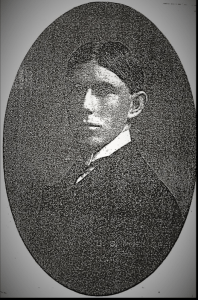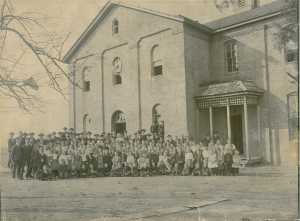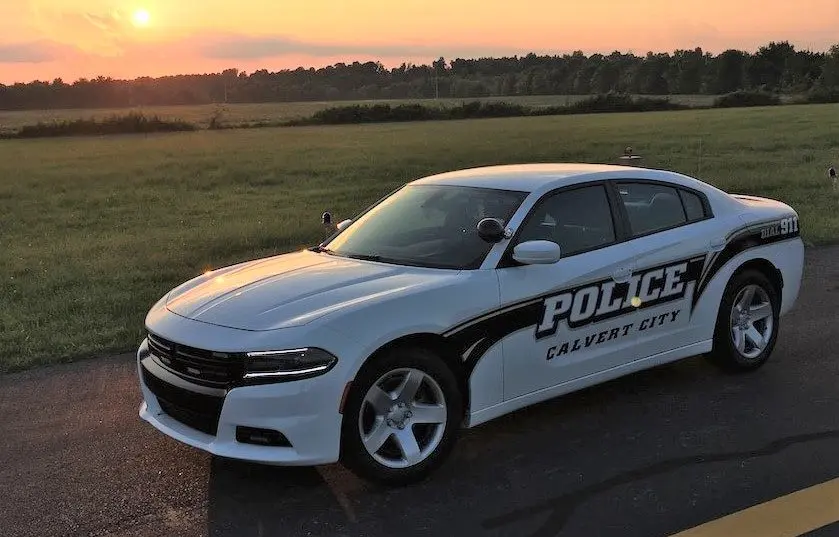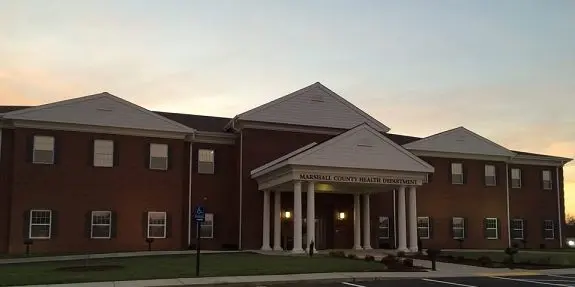THE LIFE OF JUDGE H.H. LOVETT
PART THREE: EDUCATIONAL LEADER

Written by Justin Lamb
H.H. Lovett in 1904 after graduating from Southern Normal School (now Western Kentucky University).
After graduating from college in Bowling Green in the summer of 1904, H.H. Lovett returned to his Marshall County home and began to teach in the one-room schools throughout the county. He taught at Sharpe and later went to Benton Seminary School. Lovett became a very progressive minded teacher and utilized invigorating teaching skills of the day to instruct his pupils.
Shortly after returning to Marshall County, Lovett introduced his students to the game of basketball which he learned while a student in Bowling Green. While at college, Lovett became intrigued by the new game and he purchased a round ball from one of his classmates and brought it back home where he later introduced to his students. Within a few years, the game had spread throughout the region and the people of Western Kentucky had caught “basketball fever” which is still evident today. Lovett remained a strong supporter of athletics in Marshall County for the remainder of his life.
In late 1905, voters in the city of Benton went to the polls to determine if the people in the district wished to establish and maintain a graded common school by having a tax levied on their property. A similar measure had been proposed in 1895 by the Marshall County Fiscal Court, but was defeated. Lovett was a progressive thinker and pushed hard for the measure and argued for the benefits it would have on the children of Benton. The measure passed overwhelming and on March 7, 1906, the Benton Independent Graded School was established. The following year on August 19, 1907, the school reported a whopping attendance of nearly 300 pupils. “The attendance is large and the prospects for the best nine months’ school the city ever had are good,” reported the Paducah Evening Sun.
After the creation of Benton Independent Graded Schools, work began on finding faculty to run the district. Lovett was asked to become the first principal, a job in which he immediately accepted. On Saturday, September 28, 1907, Lovett gave a presentation before the Marshall County Teacher’s Association at the Birmingham Methodist Church entitled “Should a Teacher Know Any Subjects Beside Those He is Expected to Teach?” Lovett’s work was recognized all across the state and in a 1907 article to the Benton Tribune, Lovett boldly predicted that Marshall County Schools would one day be consolidated and the students would come to school by motorized transportation. The prediction was scoffed and ridiculed by many who thought of Lovett as a “day-dreaming idealist.” Lovett continued to advocate the construction of one central high school in Marshall County long after he left the education field and he often said “Marshall County schools needed to teach kids something besides how to throw a ball through a hoop.” A few years after Lovett’s death, Marshall County, finally consolidated all of the high schools in the county when Marshall County High School was built in 1975.

Benton Seminary School. Lovett is pictured on the far left.
Lovett was a strict, but fair teacher and most often left a lasting impression on his pupils. “My dad had Mr. Lovett in school,” recalled Dr. H.W. Ford, a retired Benton physician. “Dad told me one time he and another kid got in trouble in school and Mr. Lovett sat them aside and gave them a good talking to. Instead of yelling at them, Mr. Lovett took them aside and told them how disappointed he was in them,” Ford said. “Dad said that hurt him more than if he would have got a whipping because Mr. Lovett was disappointed in him.”
***
The Progressive Era saw the call for reform and modernization in the educational system in the United States. This call was heard by many lawmakers in Kentucky and in the 1908 session of the Kentucky General Assembly, many educational reforms were passed. Often dubbed the “Education Session”, the 1908 session saw increased funding to colleges, stricter school attendance laws, and the creation of several new high schools all across the state.
In Benton, the old Marshall County Seminary School was converted into Benton High School and the mission was made to get the school up to state standards. In the fall of 1908, Lovett was promoted to the position of Superintendent of the Benton Public Schools and was elected to develop the first curriculum of the new Benton High School.
Lovett went straight to work finding the best courses to offer the students of Benton High School. Lovett believed strongly in organization and he prepared a catalog containing announcements, rules, and regulations for the teachers, principal, and pupils. The course of study prepared gave the amount of each subject to be covered by each grade and what was to be taught in the textbook. Lovett presented his course of study to the Board of Education who overwhelmingly endorsed it. The curriculum was then sent to Frankfort for approval and after final reviewing was completed, the Kentucky Department of Education approved Lovett’s proposed teaching curricula. Lovett became the first superintendent in the state of Kentucky to have achieved this accomplishment.
***
Due to his work as School Superintendent, H.H. Lovett had worked his way up from a poor farm boy to a well-respected member of the Benton community. He and his family joined the Benton Methodist Church, then known as the Martha P. Ford Memorial Methodist Church. Lovett studied The Bible daily and taught himself how to read the scripture in both Latin and Greek. With his vast knowledge of scripture, he taught Sunday School and took on various leadership roles within the Benton Methodist Church for many years.
As a boy, Lovett had been raised in the conservative Methodist Episcopal Church, South or the Southern Methodist Church. Lovett attended at Olive Methodist Church his entire childhood and early adulthood before joining the congregation at Benton. When the Olive Methodist Church needed funding to build a new church in 1941, Lovett helped raise money for the church he spent his childhood in. Still to this day, various members of the Lovett family still attend Olive Methodist Church.
On May 10, 1939, the Methodist Episcopal Church, North and Methodist Episcopal Church, South merged to form the Methodist Church. Many within the church, including Lovett, saw this as a good way for the two churches to work together to spread Christianity. Lovett, who was active in the Methodist church leadership in Marshall County, advocated for the merger. However, years later, Lovett commented in a 1970 interview that he believed his support of the merger of the two churches was the biggest mistake he made during his church service. “Less than two years after consolidating, I saw that the Southern Methodist Church had made a mistake,” Lovett commented. “Instead of cooperating with us, the Northern church just took us over completely. There are even sects of the church in the North who are not teaching the virgin birth. Since that time the Methodist Church has been losing members. However, even though there is an attempt in today’s world to destroy Christianity, I believe that Christianity will live and righteousness will prevail.”
***
As Lovett’s career continued to grow in the field of education, controversy fell at his doorstep in September 1909 when he and Miss Louella Acree (later Mrs. Louella Peterson), a teacher at Benton Graded School, were sued for wrongfully suspending one of the pupils. T.A. Griffith of Benton accused Superintendent Lovett of wrongfully suspending his younger brother, Joe Griffith, for attending a night singing class in Benton. Lovett stood firmly by his decision and explained that Joe Griffith had violated the rule, which had been endorsed and approved by the Benton School Board, which stated that children were not allowed out of their homes after seven at night during school session. Lovett went on to testify before the school board that Joe Griffith had been neglectful in his school duties and was given repeated warnings which he chose to ignore. Lovett also commented that Griffith came from a prominent Benton family and expected preferential treatment which Lovett was not going to give. The case created a sensation in Benton and went before a jury which ultimately ruled in favor of Superintendent Lovett and the Benton Public School System.
By late January 1910, H.H. Lovett was contacted by officials in Chaffee, Missouri who had learned about the job he did of creating Benton’s first teaching curricula and they wanted him to do the same for their new school district. Lovett was offered the position of Superintendent of Public Schools in Chaffee, Missouri, a job which would really elevate his career and standing in the educational world. After a great deal of convincing his wife, Lovett accepted and moved his family to Chaffee.
Located in southeastern Missouri, Chaffee was founded in June 1905 by the Chaffee Real Estate Company of St. Louis, Missouri. The first school was created in the town in 1905, but it was not a success. By 1908, things began to pick up for the developing school and the enrollment rate was up to 157 pupils, but the school had no organized course of study. Once arriving in Chaffee in the early part of 1910, Lovett went to work on implementing curricula much like he had implemented back in Marshall County. Due to the lack of records, not much else is known about Lovett’s time in Chaffee. We do know that Lovett advocated the construction of a larger high school, but the school would not be erected until 1916, long after Lovett had left Chaffee.
By the end of 1910, Lovett was offered yet another task of building up a struggling school system. This time Bardwell, Kentucky wanted him to enact his successful course of study into their school systems. Eager to get back closer to home, Lovett agreed to take the job and he moved his family to Carlisle County. However, Lovett’s career in Bardwell was very short lived. The close confinement of the small schoolhouse caused his health to rapidly fail and he was forced to resign due to his health problems. Lovett returned to Marshall County and purchased a farm near his boyhood home at the mouth of Jonathan Creek. Lovett spent the next few years of his life farming in Olive and despite being successful in the educational field, he made an awful farmer and he would often joke that “his farm was the frog farm because the only thing he could grow was frogs.” Lovett contemplated returning to education, but instead began to pursue his dream of following in his uncle John G. Lovett’s footsteps and becoming an attorney. Feeling that he had done all he could do in the educational field, Lovett soon made a trip to Benton to visit his uncle at his law office. Not long after, Lovett began an apprenticeship under his uncle and studied the law in hopes of gaining admittance to the Kentucky Bar someday.






